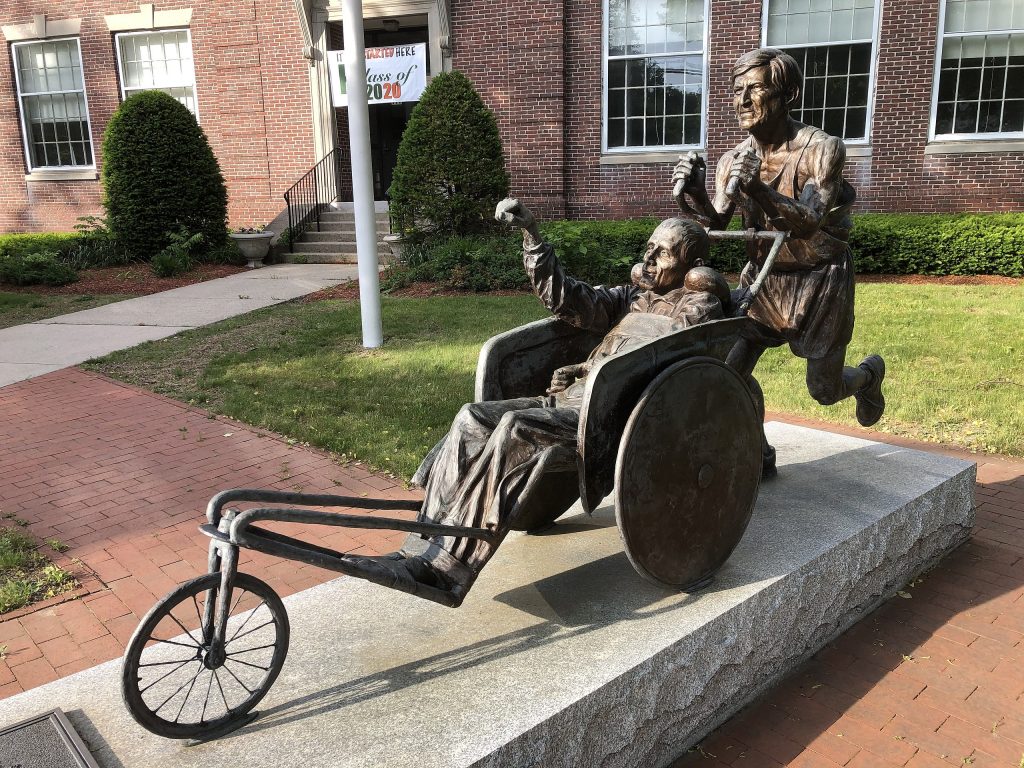There are moments when we can catch a glimpse of humanity at its best; where we get to see the glory of the human person in textured and wondrous splendour. I had one of those moments this week when a friend pointed me to the story of Dick and Rick Hoyt, told, as so many stories are these days, on YouTube!
At birth Rick Hoyt suffered complications that left him with cerebral palsy, and permanently unable to walk or talk. Rick’s parents were told he would always remain in a vegetative state, and doctors advised them to leave him in a home and forget about him. But the Hoyts refused to abandon their son and worked hard to include Rick in as normal a life as they could. At the age of 12 new technologies enabled Rick to communicate for the first time, through his computer. Soon, others would learn what his parents always believed, that theirs was an intelligent boy locked in a body that would not work.
Rick went on to complete high school and university. The enabling love of his family is powerfully symbolised by the story that is making him internet-famous. In high school Rick asked his Dad to push him in this wheel chair in a five-mile charity run. Despite Dick not being a runner, they completed the course, and that night Rick told his Dad that it made him feel like his disability disappeared. So began years of fun-runs, marathons, and eventually even ironman triathlons.

The vision accessible on the web is of ‘team Hoyt’ competing in the Hawaiian ironman triathlon, the toughest on the planet. Dick, who is in his 60s, swims the 3.8 km towing his son in a rubber dingy. He then transfers to a bike to push him 180 km. Those who know the race will remember that the heat of the lava fields across which this event takes place brings many a super athlete to their knees.
When the Hoyts arrive in the transition area at the end of the bike leg it is already dark, and as they disappear into the night with a full marathon ahead of them, one can only wonder how the sixty-seven-year-old legs could carry them any further. Dick says that the knowledge of what these events do for his son, ‘does something’ to him and he gets strength he didn’t know he had. Only the bearer of the most emotionally impenetrable heart could watch him powering to the finish line—Rick’s twisted arm waving in triumph and his contorted face bursting with tortured excitement—without getting a lump in her throat.
These astonishing physical feats act as a metaphor for the endurance test over many years that loving and caring for his afflicted son has no doubt been for Dick. But so is the triumph of the race completed—the joy of sticking with him and never giving up; of sharing in every small success and failure. Seeing this old bull of a man ploughing through the water burdened by the dead weight of his son in the boat, every ounce of strength given to bring joy to his boy, recalls a body broken for others, the laying down of a life so that another can live. Rarely could one see more clearly the love of a father at its best and most beautiful.
Christianity bequeathed a dignity and value on each person.
Historian/Theologian David Bentley Hart writes at length about the revolutionary impact Christianity had on the West and particularly our understanding of what it means to be human. Hart says that the way Christianity bequeathed a dignity and value on each person made in the image of God, was something that could not have even been imagined in the pagan Roman world into which the Christian vision was born. It was this vision that was crucial in us coming to view the handicapped, the destitute, the mentally ill, the wretched or derelict, refugees, and criminals as people of value rather than an aberration to be discarded or killed. Even if Dick Hoyt might not express it like that, he and all of us are recipients of an understanding of what is it to be human that is as exacting in the standards it sets, as it is rewarding in its implications for each and every life.
Hart argues this is due entirely to the Christian conception of the person, and warns that it remains a fragile vision. The story of Dick Hoyt’s love for his son provides a compelling portrait of that vision and why discarding it would come at cost too high to bear.
Simon Smart is the Head of Research and Communications at CPX.


